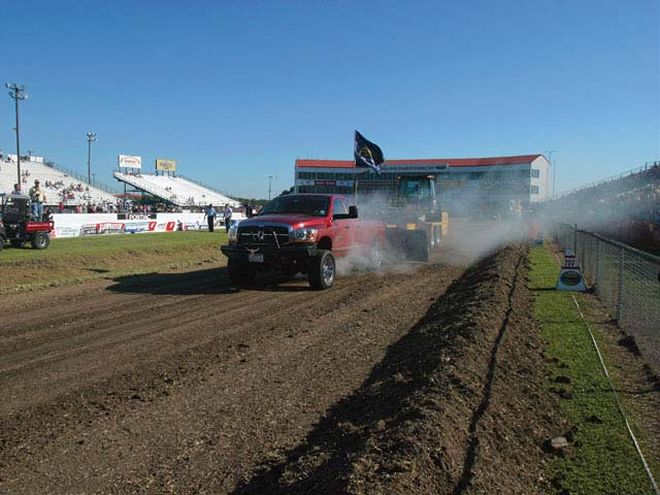
| Feel like destroying your transmission? Nothing seems to work better than sled pulling!
Diesel truck transmissions have a hard job. They have to stand up to the tremendous torque that a diesel engine can produce, tow heavy loads, and are even subject to the occasional drag race or sled pull. To find out more about diesel transmissions, we asked Dave Goerend of Goerend Transmission and Mike Lovrich of Inglewood Transmissions 20 questions about them. Goerend and Lovrich are the actual guys who get their hands dirty rebuilding these units in their shops. Although he owns a shop that can rebuild any type of transmission (he even makes his own converters), Goerend specializes in Dodges, while Lovrich rebuilds Chevy, Ford, and Dodge diesel transmissions. Both techs have built transmissions for 400hp trucks, as well as 1,000hp trucks, and everything in between. In addition to their opinions, we also threw in our own, from what we've seen at Diesel Power Challenge and other events.
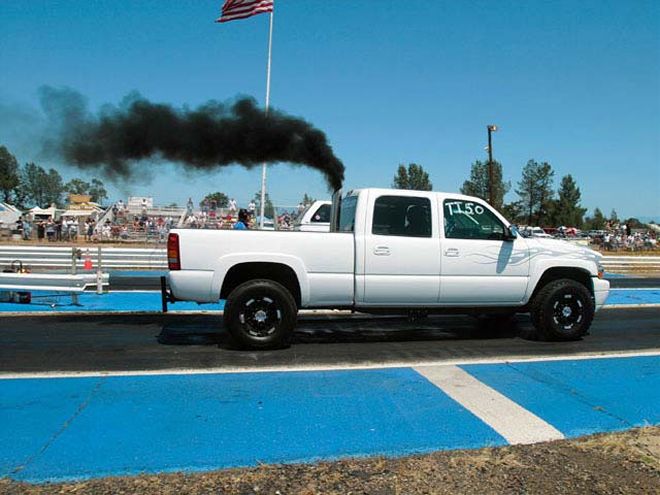
| Dave Goerend said, "At over 800 (rear wheel) horsepower, no transmission will be completely reliable. During last year's Diesel Power Challenge, Nick D'Amico, winner of the 2006 West Coast event, destroyed two transmissions just days before DPC 2007.
20 QUESTIONS...
1. How much power can a stock transmission handle?
Goerend: A bone-stock Dodge might handle about 325 horsepower. Past that, you'd better do something to the converter and valvebody.
Lovrich: About 80 hp over stock (Ford, Chevy, and Dodge) to be on the safe side. Some might take more, but some won't. There are no two transmissions that are exactly alike.
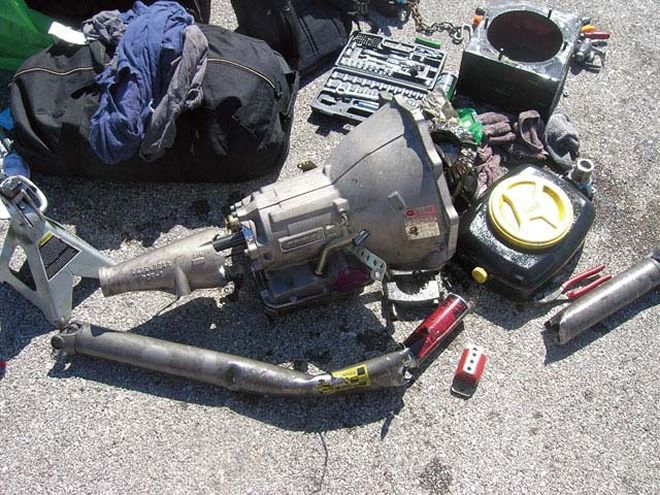
| Although this isn't a diesel transmission, we had to show you this photo. The story we heard was that the rear end broke and locked up, which bent up the driveshaft and caused the transmission case to be ripped in half. Although most diesel transmissions don't have to survive 172mph quarter-mile passes like this Mustang's did, the torque they both produce can be similar, so make sure your driveshafts and axles are up to snuff too.
2. How much power can they handle with a converter and valvebody upgrade?
Goerend: They should have no problem up to 500 horsepower with the stock shafts. If you're trying to build boost (drag racing or sled pulling), you might want to upgrade the shafts too.
Lovrich: Allison-about 150 rear wheel horsepower over stock, but that's pushing it. '03 and later Fords (5R110), with a converter and a programmer that will give you line pressure rise, will let you get away with about 120 extra hp. Earlier Fords with a TransGo shift kit can get away with 150 hp. It depends on the condition of the transmission (good working order). Shafts and flexplates are the problem with Dodges. They can hold good horsepower, but you'll start breaking shafts.
3. How do I know if my transmission is going bad?
Goerend: The first thing would be: Is it consistent? If all of a sudden it starts shuddering or shifting at different points, or you have rpm rise while going up a hill, those are good indications that your transmission might have problems.
Lovrich: Several different ways- a check engine light might come on, you could have wrong gear starts, or flared shifts. In a Ford, an overdrive light flashing will signal that you have a code.
4. What is "limp mode"?
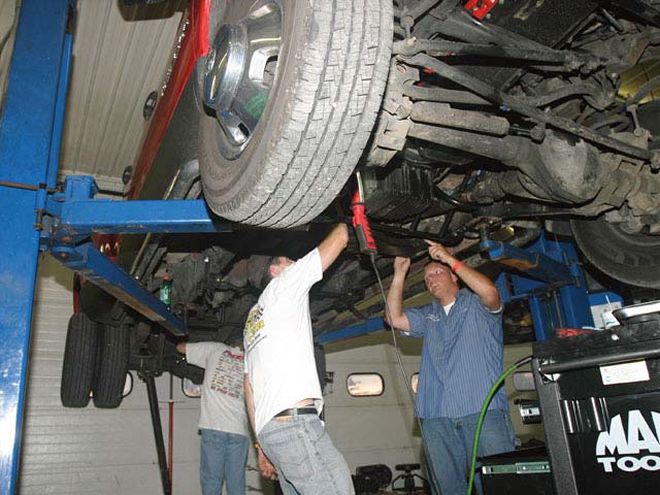
| Brian Carter had three different transmissions in his truck during Hot Rod magazine's Drag Week. Don't expect things to be easy if you're trying to propel 8,000 pounds of dualie into the 10-second range.
Goerend: "Limp home mode" is what Chrysler originally called it. It's any time the computer gets scared and doesn't see 12 volts going to the transmission (due to various possible problems). The transmission will start in Third gear because no power will be going to the computer.
Lovrich: It means go get it taken care of immediately. It will run max line pressure and no volts to the trans, so you are stuck in one gear.
5. How are the manual transmissions for reliability (Ford, Chevy, Dodge)?
Lovrich: From what I've seen, they're all pretty solid. The clutch is the weakest point, but there are a few companies that build some killer clutches out there.
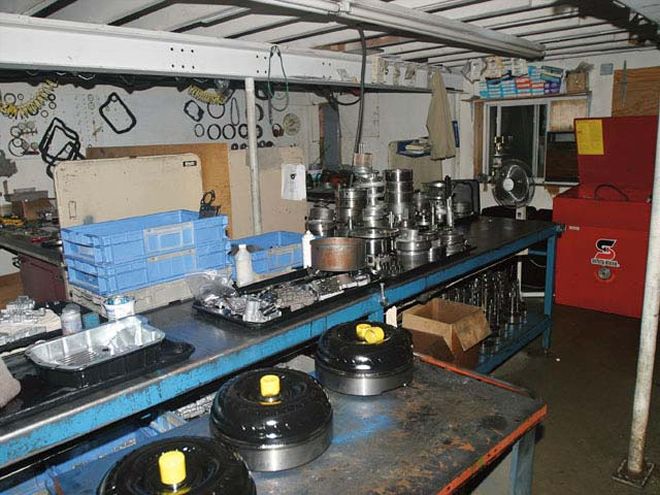
| We stopped by Goerend's shop in Saint Lucas, Iowa to pick up the new transmission for Carter's truck at 1 a.m. We also took a chance to sneak around and take a few photos of the shop and were impressed at the cleanliness-as well as the amount of hard parts.
6. At what point do I need to worry about getting billet shafts for my transmission?
Goerend: At 500 horsepower and above, I would put in a billet input; at 600-650 and above, they should probably have intermediate shafts in them, too. The intermediates are n the most danger if you're towing really, really heavy loads.
Lovrich: On an Allison, at about 600 hp and above, on a Dodge, anything above 375 hp and you're going to need at least an input shaft, and the same goes for Fords.
7. We've heard flexplates can break. Is that true?
Goerend: A lot of stock flexplates will break. Fords and Dodges seem to when you go up in torque. Above 500 horsepower, you'd better do something with the flexplate, especially with a common-rail Cummins.
Lovrich: Those Cummins are nasty and put down a bunch of torque. With the Fords, I haven't seen that many break, but above 500 hp, it would probably be a good idea. The Duramax flexplates seem to be pretty reliable.
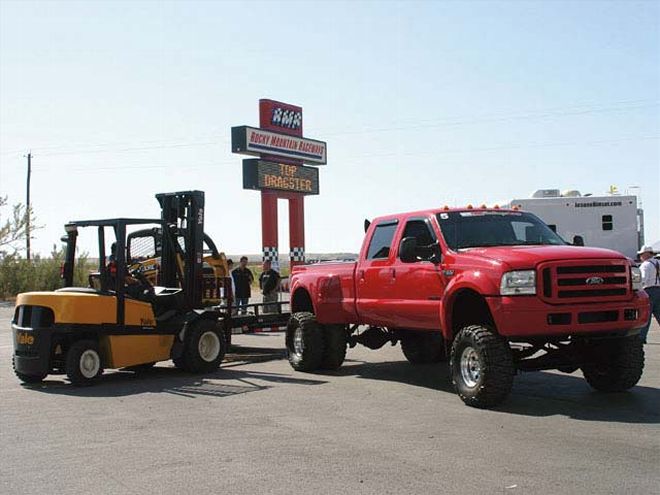
| More rotating weight also equals more stress on your transmission. Having six monster tires on your truck won't make your stock transmission happy.
8. Any info on the '08 automatics yet?
Goerend: We should have a triple-disc for the 68RFE soon. Overall, it looks like they'll be pretty solid. Physically, it looks like it will be a brute of a transmission, but for overall reliability, only time will tell.
Lovrich: They're all pretty good, but the weakest link in them by far is the converter. Even on a stock truck, yanking the transmission and putting in a converter would put you a step ahead.
9. My truck has 150-200,000 miles on it. Do I need a rebuild?
Goerend: Just because it has a lot of miles on it doesn't mean it needs to be rebuilt-200,000 highway miles is a lot different than 50,000 of use on the farm. It mostly depends on your usage and maintenance.
Lovrich: No, not necessarily. You may or may not have damaged the transmission, depending on how you drove it. At that point, you may not need one, but it would be a good idea. A rebuild that is built correctly should last another 150,000 miles, no problem.
10. What are the Ford transmission's strong/weak points?
Lovrich: Those Ford transmissions are big, so the strong point is just its size. The weak point is the converter and the valvebody programming of the transmission. If you're going to buy a programmer for a 6.0L Ford, you definitely need to buy one that raises transmission line pressure.
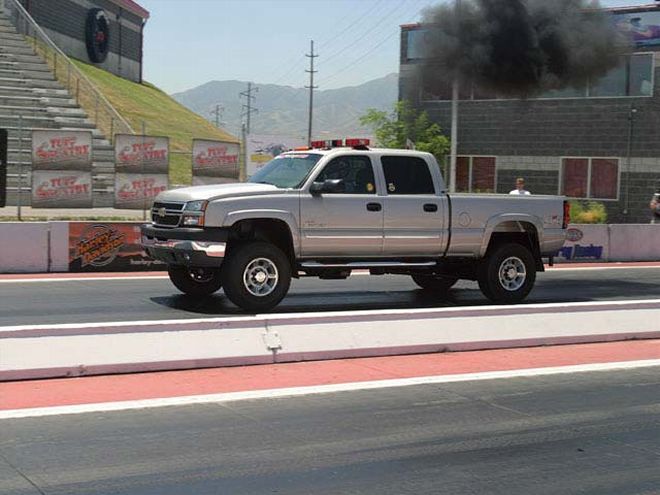
| Drag racing is hard on input shafts. If you're going to be leaving the line hard enough to generate 1.7-second 60-foot times in a 7,000-pound truck, like Tony Burkhart, then you'd better have a fully upgraded transmission. Burkhart did, and he was looking strong at Diesel Power Challenge until a nitrous backfire sent him packing.
11. What are the Dodge transmission's strong/weak points?
Goerend: On a '96 and newer, the line pressure, converter clutch, and converter all need help. In 1996, Chrysler upgraded the front planetary gears and overdrive section, and those were a lot stronger than the '94s and '95s. And, of course, if you're over 500 horsepower, the stock shafts can break.
12. What are the Allison transmission's strong/weak points?
Lovrich: The Allison's weak points are the TCM programming and the converter. It's always learning, which sometimes hurts more than it helps. If you've been driving in city traffic for an hour and then hammer it, the transmission will still be used to low speeds, and you can actually hurt your transmission.
13. I'm going drag racing/sled pulling. Should I worry about my transmission breaking?
Goerend: At stock power levels, it should be OK as long as you don't build too much boost while the truck isn't moving. If you're going to do it regularly, you should upgrade your transmission.
14. What is "stall speed"? Does my torque converter need a lot or a little of it?
Lovrich: It's the max rpm your engine can reach while standing on the brake and flooring it. Diesels like lower stall speeds because they have a smaller power window to work with, and they like their power down low.
15. What's "lock-up"?
Lovrich: It's when a clutch in your torque converter locks up and turns your converter into one big connecting shaft. Good news is that if your lock-up clutch(es) slip or fail, the transmission may still be fine.
16. Why are diesel transmissions so expensive?
Goerend: Number one, the lock-up converter. Parts alone are a lot more expensive for those. All diesel transmissions have an overdrive, so that is an extra expense, too. They're under more stress, so we put all new input shafts and bearings in each transmission. Anything you do to reduce costs will come back to you later.
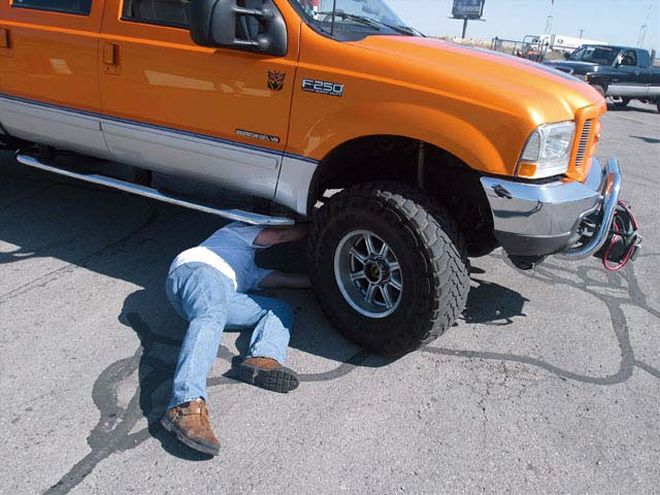
| Another Diesel Power Challenge competitor who fell on hard times was Danny Elmo, who had converter, transmission, and transfer case problems all weekend. We even saw some molten metal falling out by his converter during one dyno run. As we said, 700 horsepower and 8,000 pounds, along with sled pulling and drag racing, can be murder for diesel transmissions.
17. My transmission seems like it is slipping. How do I know if it is the converter or clutches?
Goerend: Normally, the clutches won't take it for very long. If you can feel a difference in a certain gear (versus all the time, in all the gears), it could be your clutches. If you feel a shudder while the converter is unlocked, it is also most likely something internal.
18. Will nitrous hurt my transmission?
Goerend: (Laughs) Yes. If you're going to be putting nitrous on there, you're probably above 500 horsepower and either drag racing or sled pulling, so not only are you making more power, but you're being hard on the transmission.
19. I am going to be towing a camper with my truck. Do I need to worry about my transmission?
Goerend: Probably not at stock power. If you've increased the power (even a little), you may be looking for trouble. A converter and valvebody can help with slippage, but if you're towing really heavy (overloading), you need to worry about the input and intermediate shafts. A large transmission cooler (or second one) will also help.
Lovrich: You have to worry about transmission cooling, but other than that, this is what these trucks are designed to do, so not really.
20. Any last words of wisdom?
Goerend: Make sure your transmission is full of fluid! The number one and number two causes of failures are running the transmission low on fluid. When you add fluid, walk away from the truck for 10 minutes to allow the fluid to drain in so you don't get a false reading. Running the transmission "a little low on fluid" should never be done. It should always be completely full.
Lovrich: All the newer trucks are pretty well-built. I'd like to see the factory put in stronger converters. These trucks are better than they have ever been. If you're going to modify your truck by adding power, you need to address the transmission immediately. These transmissions were not built from the factory to spin up really quick and handle 500 horsepower. They were built to move heavy and steady and tow things.
 | Feel like destroying your transmission? Nothing seems to work better than sled pulling!
Diesel truck transmissions have a hard job. They have to stand up to the tremendous torque that a diesel engine can produce, tow heavy loads, and are even subject to the occasional drag race or sled pull. To find out more about diesel transmissions, we asked Dave Goerend of Goerend Transmission and Mike Lovrich of Inglewood Transmissions 20 questions about them. Goerend and Lovrich are the actual guys who get their hands dirty rebuilding these units in their shops. Although he owns a shop that can rebuild any type of transmission (he even makes his own converters), Goerend specializes in Dodges, while Lovrich rebuilds Chevy, Ford, and Dodge diesel transmissions. Both techs have built transmissions for 400hp trucks, as well as 1,000hp trucks, and everything in between. In addition to their opinions, we also threw in our own, from what we've seen at Diesel Power Challenge and other events.
| Feel like destroying your transmission? Nothing seems to work better than sled pulling!
Diesel truck transmissions have a hard job. They have to stand up to the tremendous torque that a diesel engine can produce, tow heavy loads, and are even subject to the occasional drag race or sled pull. To find out more about diesel transmissions, we asked Dave Goerend of Goerend Transmission and Mike Lovrich of Inglewood Transmissions 20 questions about them. Goerend and Lovrich are the actual guys who get their hands dirty rebuilding these units in their shops. Although he owns a shop that can rebuild any type of transmission (he even makes his own converters), Goerend specializes in Dodges, while Lovrich rebuilds Chevy, Ford, and Dodge diesel transmissions. Both techs have built transmissions for 400hp trucks, as well as 1,000hp trucks, and everything in between. In addition to their opinions, we also threw in our own, from what we've seen at Diesel Power Challenge and other events.
 | Dave Goerend said, "At over 800 (rear wheel) horsepower, no transmission will be completely reliable. During last year's Diesel Power Challenge, Nick D'Amico, winner of the 2006 West Coast event, destroyed two transmissions just days before DPC 2007.
20 QUESTIONS...
1. How much power can a stock transmission handle?
Goerend: A bone-stock Dodge might handle about 325 horsepower. Past that, you'd better do something to the converter and valvebody.
Lovrich: About 80 hp over stock (Ford, Chevy, and Dodge) to be on the safe side. Some might take more, but some won't. There are no two transmissions that are exactly alike.
| Dave Goerend said, "At over 800 (rear wheel) horsepower, no transmission will be completely reliable. During last year's Diesel Power Challenge, Nick D'Amico, winner of the 2006 West Coast event, destroyed two transmissions just days before DPC 2007.
20 QUESTIONS...
1. How much power can a stock transmission handle?
Goerend: A bone-stock Dodge might handle about 325 horsepower. Past that, you'd better do something to the converter and valvebody.
Lovrich: About 80 hp over stock (Ford, Chevy, and Dodge) to be on the safe side. Some might take more, but some won't. There are no two transmissions that are exactly alike.
 | Although this isn't a diesel transmission, we had to show you this photo. The story we heard was that the rear end broke and locked up, which bent up the driveshaft and caused the transmission case to be ripped in half. Although most diesel transmissions don't have to survive 172mph quarter-mile passes like this Mustang's did, the torque they both produce can be similar, so make sure your driveshafts and axles are up to snuff too.
2. How much power can they handle with a converter and valvebody upgrade?
Goerend: They should have no problem up to 500 horsepower with the stock shafts. If you're trying to build boost (drag racing or sled pulling), you might want to upgrade the shafts too.
Lovrich: Allison-about 150 rear wheel horsepower over stock, but that's pushing it. '03 and later Fords (5R110), with a converter and a programmer that will give you line pressure rise, will let you get away with about 120 extra hp. Earlier Fords with a TransGo shift kit can get away with 150 hp. It depends on the condition of the transmission (good working order). Shafts and flexplates are the problem with Dodges. They can hold good horsepower, but you'll start breaking shafts.
3. How do I know if my transmission is going bad?
Goerend: The first thing would be: Is it consistent? If all of a sudden it starts shuddering or shifting at different points, or you have rpm rise while going up a hill, those are good indications that your transmission might have problems.
Lovrich: Several different ways- a check engine light might come on, you could have wrong gear starts, or flared shifts. In a Ford, an overdrive light flashing will signal that you have a code.
4. What is "limp mode"?
| Although this isn't a diesel transmission, we had to show you this photo. The story we heard was that the rear end broke and locked up, which bent up the driveshaft and caused the transmission case to be ripped in half. Although most diesel transmissions don't have to survive 172mph quarter-mile passes like this Mustang's did, the torque they both produce can be similar, so make sure your driveshafts and axles are up to snuff too.
2. How much power can they handle with a converter and valvebody upgrade?
Goerend: They should have no problem up to 500 horsepower with the stock shafts. If you're trying to build boost (drag racing or sled pulling), you might want to upgrade the shafts too.
Lovrich: Allison-about 150 rear wheel horsepower over stock, but that's pushing it. '03 and later Fords (5R110), with a converter and a programmer that will give you line pressure rise, will let you get away with about 120 extra hp. Earlier Fords with a TransGo shift kit can get away with 150 hp. It depends on the condition of the transmission (good working order). Shafts and flexplates are the problem with Dodges. They can hold good horsepower, but you'll start breaking shafts.
3. How do I know if my transmission is going bad?
Goerend: The first thing would be: Is it consistent? If all of a sudden it starts shuddering or shifting at different points, or you have rpm rise while going up a hill, those are good indications that your transmission might have problems.
Lovrich: Several different ways- a check engine light might come on, you could have wrong gear starts, or flared shifts. In a Ford, an overdrive light flashing will signal that you have a code.
4. What is "limp mode"?
 | Brian Carter had three different transmissions in his truck during Hot Rod magazine's Drag Week. Don't expect things to be easy if you're trying to propel 8,000 pounds of dualie into the 10-second range.
Goerend: "Limp home mode" is what Chrysler originally called it. It's any time the computer gets scared and doesn't see 12 volts going to the transmission (due to various possible problems). The transmission will start in Third gear because no power will be going to the computer.
Lovrich: It means go get it taken care of immediately. It will run max line pressure and no volts to the trans, so you are stuck in one gear.
5. How are the manual transmissions for reliability (Ford, Chevy, Dodge)?
Lovrich: From what I've seen, they're all pretty solid. The clutch is the weakest point, but there are a few companies that build some killer clutches out there.
| Brian Carter had three different transmissions in his truck during Hot Rod magazine's Drag Week. Don't expect things to be easy if you're trying to propel 8,000 pounds of dualie into the 10-second range.
Goerend: "Limp home mode" is what Chrysler originally called it. It's any time the computer gets scared and doesn't see 12 volts going to the transmission (due to various possible problems). The transmission will start in Third gear because no power will be going to the computer.
Lovrich: It means go get it taken care of immediately. It will run max line pressure and no volts to the trans, so you are stuck in one gear.
5. How are the manual transmissions for reliability (Ford, Chevy, Dodge)?
Lovrich: From what I've seen, they're all pretty solid. The clutch is the weakest point, but there are a few companies that build some killer clutches out there.
 | We stopped by Goerend's shop in Saint Lucas, Iowa to pick up the new transmission for Carter's truck at 1 a.m. We also took a chance to sneak around and take a few photos of the shop and were impressed at the cleanliness-as well as the amount of hard parts.
6. At what point do I need to worry about getting billet shafts for my transmission?
Goerend: At 500 horsepower and above, I would put in a billet input; at 600-650 and above, they should probably have intermediate shafts in them, too. The intermediates are n the most danger if you're towing really, really heavy loads.
Lovrich: On an Allison, at about 600 hp and above, on a Dodge, anything above 375 hp and you're going to need at least an input shaft, and the same goes for Fords.
7. We've heard flexplates can break. Is that true?
Goerend: A lot of stock flexplates will break. Fords and Dodges seem to when you go up in torque. Above 500 horsepower, you'd better do something with the flexplate, especially with a common-rail Cummins.
Lovrich: Those Cummins are nasty and put down a bunch of torque. With the Fords, I haven't seen that many break, but above 500 hp, it would probably be a good idea. The Duramax flexplates seem to be pretty reliable.
| We stopped by Goerend's shop in Saint Lucas, Iowa to pick up the new transmission for Carter's truck at 1 a.m. We also took a chance to sneak around and take a few photos of the shop and were impressed at the cleanliness-as well as the amount of hard parts.
6. At what point do I need to worry about getting billet shafts for my transmission?
Goerend: At 500 horsepower and above, I would put in a billet input; at 600-650 and above, they should probably have intermediate shafts in them, too. The intermediates are n the most danger if you're towing really, really heavy loads.
Lovrich: On an Allison, at about 600 hp and above, on a Dodge, anything above 375 hp and you're going to need at least an input shaft, and the same goes for Fords.
7. We've heard flexplates can break. Is that true?
Goerend: A lot of stock flexplates will break. Fords and Dodges seem to when you go up in torque. Above 500 horsepower, you'd better do something with the flexplate, especially with a common-rail Cummins.
Lovrich: Those Cummins are nasty and put down a bunch of torque. With the Fords, I haven't seen that many break, but above 500 hp, it would probably be a good idea. The Duramax flexplates seem to be pretty reliable.
 | More rotating weight also equals more stress on your transmission. Having six monster tires on your truck won't make your stock transmission happy.
8. Any info on the '08 automatics yet?
Goerend: We should have a triple-disc for the 68RFE soon. Overall, it looks like they'll be pretty solid. Physically, it looks like it will be a brute of a transmission, but for overall reliability, only time will tell.
Lovrich: They're all pretty good, but the weakest link in them by far is the converter. Even on a stock truck, yanking the transmission and putting in a converter would put you a step ahead.
9. My truck has 150-200,000 miles on it. Do I need a rebuild?
Goerend: Just because it has a lot of miles on it doesn't mean it needs to be rebuilt-200,000 highway miles is a lot different than 50,000 of use on the farm. It mostly depends on your usage and maintenance.
Lovrich: No, not necessarily. You may or may not have damaged the transmission, depending on how you drove it. At that point, you may not need one, but it would be a good idea. A rebuild that is built correctly should last another 150,000 miles, no problem.
10. What are the Ford transmission's strong/weak points?
Lovrich: Those Ford transmissions are big, so the strong point is just its size. The weak point is the converter and the valvebody programming of the transmission. If you're going to buy a programmer for a 6.0L Ford, you definitely need to buy one that raises transmission line pressure.
| More rotating weight also equals more stress on your transmission. Having six monster tires on your truck won't make your stock transmission happy.
8. Any info on the '08 automatics yet?
Goerend: We should have a triple-disc for the 68RFE soon. Overall, it looks like they'll be pretty solid. Physically, it looks like it will be a brute of a transmission, but for overall reliability, only time will tell.
Lovrich: They're all pretty good, but the weakest link in them by far is the converter. Even on a stock truck, yanking the transmission and putting in a converter would put you a step ahead.
9. My truck has 150-200,000 miles on it. Do I need a rebuild?
Goerend: Just because it has a lot of miles on it doesn't mean it needs to be rebuilt-200,000 highway miles is a lot different than 50,000 of use on the farm. It mostly depends on your usage and maintenance.
Lovrich: No, not necessarily. You may or may not have damaged the transmission, depending on how you drove it. At that point, you may not need one, but it would be a good idea. A rebuild that is built correctly should last another 150,000 miles, no problem.
10. What are the Ford transmission's strong/weak points?
Lovrich: Those Ford transmissions are big, so the strong point is just its size. The weak point is the converter and the valvebody programming of the transmission. If you're going to buy a programmer for a 6.0L Ford, you definitely need to buy one that raises transmission line pressure.
 | Drag racing is hard on input shafts. If you're going to be leaving the line hard enough to generate 1.7-second 60-foot times in a 7,000-pound truck, like Tony Burkhart, then you'd better have a fully upgraded transmission. Burkhart did, and he was looking strong at Diesel Power Challenge until a nitrous backfire sent him packing.
11. What are the Dodge transmission's strong/weak points?
Goerend: On a '96 and newer, the line pressure, converter clutch, and converter all need help. In 1996, Chrysler upgraded the front planetary gears and overdrive section, and those were a lot stronger than the '94s and '95s. And, of course, if you're over 500 horsepower, the stock shafts can break.
12. What are the Allison transmission's strong/weak points?
Lovrich: The Allison's weak points are the TCM programming and the converter. It's always learning, which sometimes hurts more than it helps. If you've been driving in city traffic for an hour and then hammer it, the transmission will still be used to low speeds, and you can actually hurt your transmission.
13. I'm going drag racing/sled pulling. Should I worry about my transmission breaking?
Goerend: At stock power levels, it should be OK as long as you don't build too much boost while the truck isn't moving. If you're going to do it regularly, you should upgrade your transmission.
14. What is "stall speed"? Does my torque converter need a lot or a little of it?
Lovrich: It's the max rpm your engine can reach while standing on the brake and flooring it. Diesels like lower stall speeds because they have a smaller power window to work with, and they like their power down low.
15. What's "lock-up"?
Lovrich: It's when a clutch in your torque converter locks up and turns your converter into one big connecting shaft. Good news is that if your lock-up clutch(es) slip or fail, the transmission may still be fine.
16. Why are diesel transmissions so expensive?
Goerend: Number one, the lock-up converter. Parts alone are a lot more expensive for those. All diesel transmissions have an overdrive, so that is an extra expense, too. They're under more stress, so we put all new input shafts and bearings in each transmission. Anything you do to reduce costs will come back to you later.
| Drag racing is hard on input shafts. If you're going to be leaving the line hard enough to generate 1.7-second 60-foot times in a 7,000-pound truck, like Tony Burkhart, then you'd better have a fully upgraded transmission. Burkhart did, and he was looking strong at Diesel Power Challenge until a nitrous backfire sent him packing.
11. What are the Dodge transmission's strong/weak points?
Goerend: On a '96 and newer, the line pressure, converter clutch, and converter all need help. In 1996, Chrysler upgraded the front planetary gears and overdrive section, and those were a lot stronger than the '94s and '95s. And, of course, if you're over 500 horsepower, the stock shafts can break.
12. What are the Allison transmission's strong/weak points?
Lovrich: The Allison's weak points are the TCM programming and the converter. It's always learning, which sometimes hurts more than it helps. If you've been driving in city traffic for an hour and then hammer it, the transmission will still be used to low speeds, and you can actually hurt your transmission.
13. I'm going drag racing/sled pulling. Should I worry about my transmission breaking?
Goerend: At stock power levels, it should be OK as long as you don't build too much boost while the truck isn't moving. If you're going to do it regularly, you should upgrade your transmission.
14. What is "stall speed"? Does my torque converter need a lot or a little of it?
Lovrich: It's the max rpm your engine can reach while standing on the brake and flooring it. Diesels like lower stall speeds because they have a smaller power window to work with, and they like their power down low.
15. What's "lock-up"?
Lovrich: It's when a clutch in your torque converter locks up and turns your converter into one big connecting shaft. Good news is that if your lock-up clutch(es) slip or fail, the transmission may still be fine.
16. Why are diesel transmissions so expensive?
Goerend: Number one, the lock-up converter. Parts alone are a lot more expensive for those. All diesel transmissions have an overdrive, so that is an extra expense, too. They're under more stress, so we put all new input shafts and bearings in each transmission. Anything you do to reduce costs will come back to you later.
 | Another Diesel Power Challenge competitor who fell on hard times was Danny Elmo, who had converter, transmission, and transfer case problems all weekend. We even saw some molten metal falling out by his converter during one dyno run. As we said, 700 horsepower and 8,000 pounds, along with sled pulling and drag racing, can be murder for diesel transmissions.
17. My transmission seems like it is slipping. How do I know if it is the converter or clutches?
Goerend: Normally, the clutches won't take it for very long. If you can feel a difference in a certain gear (versus all the time, in all the gears), it could be your clutches. If you feel a shudder while the converter is unlocked, it is also most likely something internal.
18. Will nitrous hurt my transmission?
Goerend: (Laughs) Yes. If you're going to be putting nitrous on there, you're probably above 500 horsepower and either drag racing or sled pulling, so not only are you making more power, but you're being hard on the transmission.
19. I am going to be towing a camper with my truck. Do I need to worry about my transmission?
Goerend: Probably not at stock power. If you've increased the power (even a little), you may be looking for trouble. A converter and valvebody can help with slippage, but if you're towing really heavy (overloading), you need to worry about the input and intermediate shafts. A large transmission cooler (or second one) will also help.
Lovrich: You have to worry about transmission cooling, but other than that, this is what these trucks are designed to do, so not really.
20. Any last words of wisdom?
Goerend: Make sure your transmission is full of fluid! The number one and number two causes of failures are running the transmission low on fluid. When you add fluid, walk away from the truck for 10 minutes to allow the fluid to drain in so you don't get a false reading. Running the transmission "a little low on fluid" should never be done. It should always be completely full.
Lovrich: All the newer trucks are pretty well-built. I'd like to see the factory put in stronger converters. These trucks are better than they have ever been. If you're going to modify your truck by adding power, you need to address the transmission immediately. These transmissions were not built from the factory to spin up really quick and handle 500 horsepower. They were built to move heavy and steady and tow things.
| Another Diesel Power Challenge competitor who fell on hard times was Danny Elmo, who had converter, transmission, and transfer case problems all weekend. We even saw some molten metal falling out by his converter during one dyno run. As we said, 700 horsepower and 8,000 pounds, along with sled pulling and drag racing, can be murder for diesel transmissions.
17. My transmission seems like it is slipping. How do I know if it is the converter or clutches?
Goerend: Normally, the clutches won't take it for very long. If you can feel a difference in a certain gear (versus all the time, in all the gears), it could be your clutches. If you feel a shudder while the converter is unlocked, it is also most likely something internal.
18. Will nitrous hurt my transmission?
Goerend: (Laughs) Yes. If you're going to be putting nitrous on there, you're probably above 500 horsepower and either drag racing or sled pulling, so not only are you making more power, but you're being hard on the transmission.
19. I am going to be towing a camper with my truck. Do I need to worry about my transmission?
Goerend: Probably not at stock power. If you've increased the power (even a little), you may be looking for trouble. A converter and valvebody can help with slippage, but if you're towing really heavy (overloading), you need to worry about the input and intermediate shafts. A large transmission cooler (or second one) will also help.
Lovrich: You have to worry about transmission cooling, but other than that, this is what these trucks are designed to do, so not really.
20. Any last words of wisdom?
Goerend: Make sure your transmission is full of fluid! The number one and number two causes of failures are running the transmission low on fluid. When you add fluid, walk away from the truck for 10 minutes to allow the fluid to drain in so you don't get a false reading. Running the transmission "a little low on fluid" should never be done. It should always be completely full.
Lovrich: All the newer trucks are pretty well-built. I'd like to see the factory put in stronger converters. These trucks are better than they have ever been. If you're going to modify your truck by adding power, you need to address the transmission immediately. These transmissions were not built from the factory to spin up really quick and handle 500 horsepower. They were built to move heavy and steady and tow things.